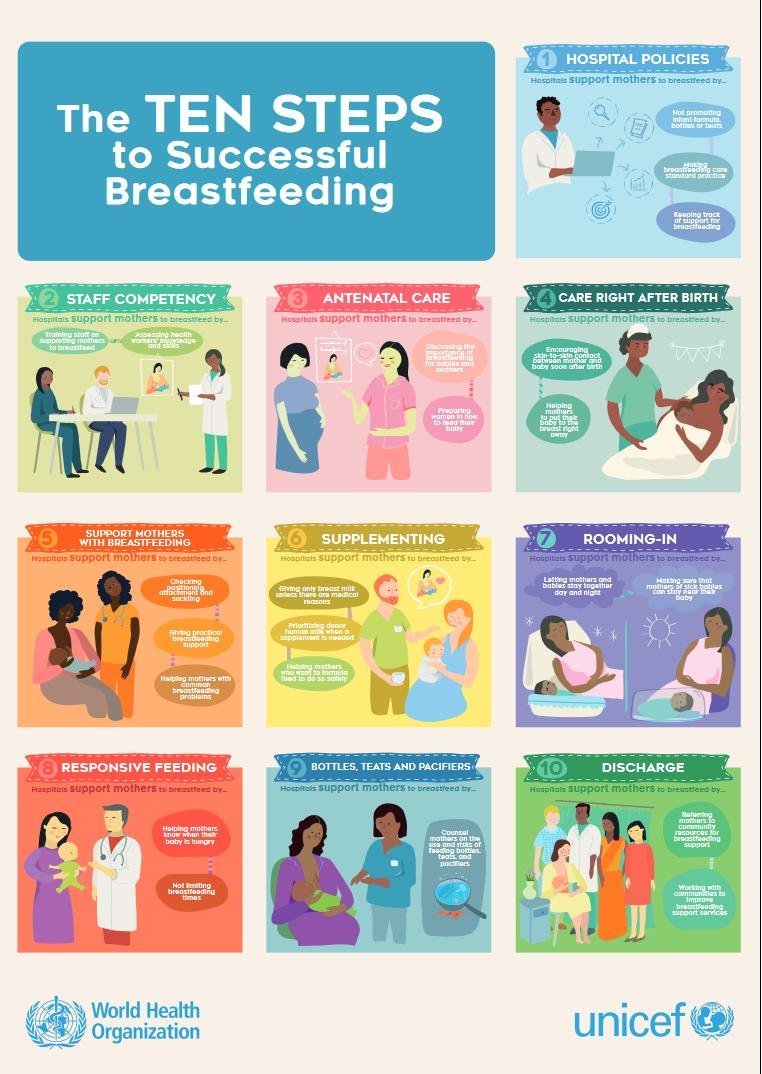
The American Academy of Paediatrics (AAP) and World Health Organization (WHO) have declared breastfeeding and the administration of human milk to be the normative practice for infant feeding and nutrition. Thus the decision to breastfeed should be considered a public health issue and not only a lifestyle choice.
All new born who cry soon after birth and do not show any signs of illness must be kept close to the mother and put to breast as early as possible. This will ensure warmth, initiation of breast feeding and emotional bonding between mother and baby. The success of breastfeeding practices of the mother are influenced by many factors such as education, religion, knowledge, attitude about breast feeding in mother and hospital breastfeeding practices and policies, routine and timely follow up care, and family and societal support.
ADVANTAGES OF BREAST FEEDING:
BENEFITS TO THE BABY:
.NUTRTIONAL SUPERIORITY: Breast milk contains all the nutrients a baby needs for normal growth and development, in an optimum proportion and in a form that is easily digested and absorbed. Sufficient to the needs of the baby in the first 6 months of life.
. IMMUNOLOGICAL SUPERIORITY: Breast milk contains a number of protective factors which include immunoglobulins mainly secretary IgA, macrophages, lymphocytes, lactoferrin, lysozyme, bifidus factor and interferon. Breast fed babies are likely to develop less infection. A breast fed baby is 14 times less likely to die of diarrhoea and almost 4 times less likely to die of respiratory diseases.
PROTECTION AGAINST OTHER ILLNESS: breast fed babies has lower risk of allergy, ear infections, and orthodontic problems. They have a lower risk of diabetes, heart disease, and lymphoma in later life.
BENEFITS TO THE MOTHER
- During breast feeding there is a release of oxytocin to eject the milk, oxytocin helps to contract the uterus.
- Breast feeding delays ovulation and onset of mensturation.
- Breast feeding helps to maintain and regain their pre pregnancy weight.
- Mothers who breast feed their babies have a reduced risk of development of breast and ovarian cancer and maternal cardiovascular diseases, osteoporosis.
- Reduction in risk of postnatal depression
BENEFITS TO ECONOMY & FAMILY:
A lack of breastfeeding or poor breastfeeding practices lead to high health care costs for the household and the health services due to increased child morbidity, as well as the health care costs to deal with consequences of not breastfeeding, including long term consequences related to obesity and chronic diseases. The much higher mortality associated with not breastfeeding also represents a drain on country‘s economies. When infant illness due to lack of breastfeeding requires mothers to miss work, households, employers and the economy are all affected. A lack of breastfeeding also impacts human capital development. In addition, artificial feeding leads to additional expenditure and workload for households.
We at AV Hospital are striving hard to achieve exclusive breastfeeding in 100 percent of mothers and we have a team of doctors and nursing staff to help all the mothers at encourage and achieve the same round the clock.
Blog by Dr. Nagalatha,
Consultant in AV Hospital, Basavanagudi
References from
IYCF guidelines
WHO guidelines


